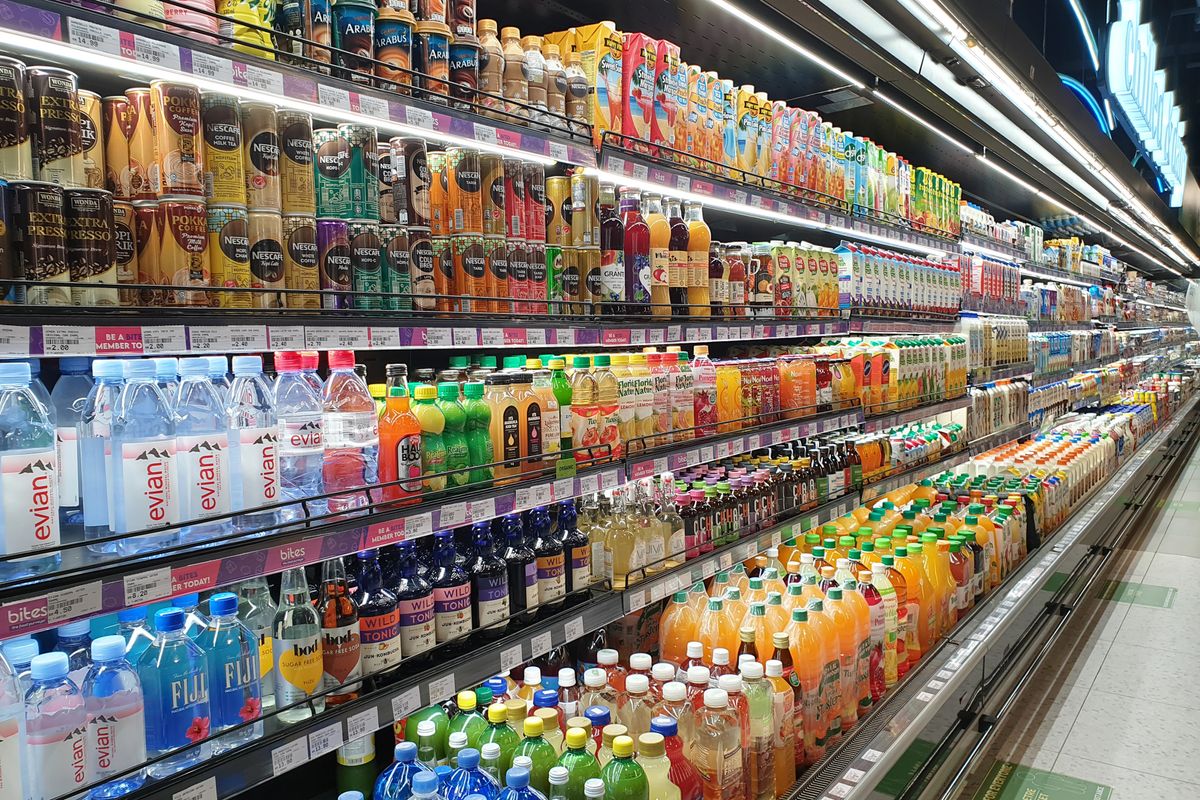When it comes to making informed decisions about the food and beverages we consume, it's crucial to understand what to steer clear of. In a sea of juice options at the store, not all brands are equal, and some can have a more negative impact on our health than we realize. To shed light on these subpar choices, we reached out to expert dietitians who have compiled a comprehensive list of juice brands that fall short in terms of nutrition and overall health.
From sugar-laden blends to misleading claims of being healthy, get ready to discover which juice brands to skip if you're committed to a healthier lifestyle. Additionally, we provide additional tips to help you differentiate between genuinely healthy foods and the imposters out there.
Unveiling the Truth Behind Fruit Juice's Healthiness
Store-bought fruit juices often employ various labeling strategies to create an illusion of healthiness. These marketing tactics, known as "health halos," aim to entice consumers and promote higher consumption. However, it's important to note that many of these juices still contain significant amounts of sugar per serving.
Let's explore some common misleading marketing tactics used with juice products:
- "Natural" or "all-natural": These labels imply that the juice is made from natural ingredients without artificial additives. However, they don't guarantee the absence of added sugars or other unhealthy components.
- "No added sugars": This claim suggests that the juice doesn't contain additional sugar during processing. Yet, it doesn't guarantee that the juice is naturally low in sugar, as it may still have high levels of naturally occurring sugars from the fruit.
- "Organic": This label indicates that the juice is made from organically grown fruits, cultivated without synthetic pesticides or GMOs. While organic is a positive attribute, it doesn't necessarily mean the juice is low in sugar or calories.
- "Fortified": This claim implies that the juice has been enriched with extra nutrients like vitamins or minerals. While fortification can enhance the nutritional value, it's crucial to consider the overall sugar and calorie content.
- Imagery featuring fresh fruits or vegetables: Colorful images of vibrant produce on the label can give the impression of a nutritious juice. However, it's essential to read the nutrition facts and ingredient list to gain a true understanding of the juice's actual contents.
Mastering the Art of Shopping for Healthy Juice Brands
While it's disappointing to discover that not all store-bought juices are as healthy as they claim to be or free from hidden sugar pitfalls, there's still hope. By honing your label-reading skills, you can navigate through the confusion and make informed choices when it comes to purchasing juice.
Here are some key factors to consider when shopping for genuinely healthy juice brands:
- Look for 100% fruit juice: Opt for juices that are made solely from fruit without any added sugars or extra ingredients. The primary ingredient should be the fruit juice itself, and if added sugar is listed among the top three ingredients, it's likely not a healthy option.
- Limit sugar content: While it's important to be mindful of added sugars, you may wonder about the naturally occurring sugars in fruit juice. As a registered dietitian, I recommend choosing juices with 12 grams of sugar or less to help moderate your sugar intake.
- Seek fortified juices with low sugar and calorie content: If you prefer drinking juice over eating whole fruits, opt for brands that fortify their juices with additional nutrients. Look for juices that offer health benefits beyond basic fruit consumption, such as added fiber to support digestive health. This way, you can maximize the nutritional value of your juice choice.
Now that you know how to identify genuinely healthy fruit juice, it's time to uncover the juice brands that masquerade as nutritious but fall short according to dietitians. Discover which so-called "healthy" juice brands to avoid and heed the advice of RDs.
1) Bolthouse Farms' Green Goddess
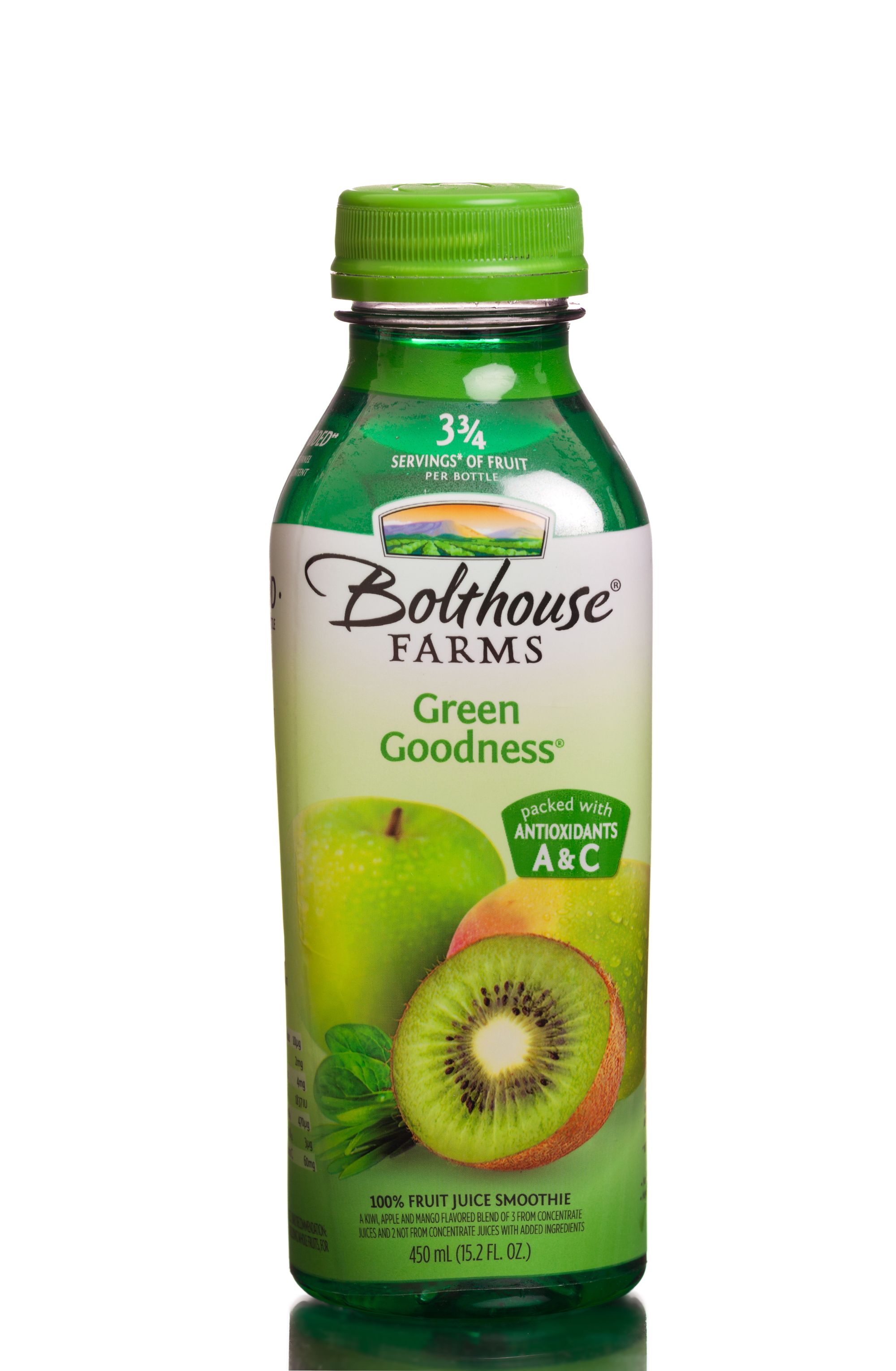
PER 8 OZ: 120 calories, 0g fat, 25mg sodium, 30g carbs (1 g fiber, 26 g sugar), 1g protein
Jessie Hulsey, RD, an Atlanta-based dietitian, points out the concerning truth about Bolthouse Farms' Green Goddess, which may initially appear to be a nutritious choice due to its combination of spinach, kale, and spirulina. However, upon closer examination of its nutritional profile, a significant problem emerges.
"This smoothie's nutritional shortcomings are evident," Jessie explains. "With a whopping 46 grams of total sugar, a mere 3 grams of fiber, and only 2 grams of protein per serving, it fails to provide the balanced nutrition individuals require. The excessive sugar content, combined with inadequate fiber and protein, can lead to blood sugar spikes, compromised digestion, and insufficient satiety."
2) Ocean Spray Cranberry Juice Cocktail
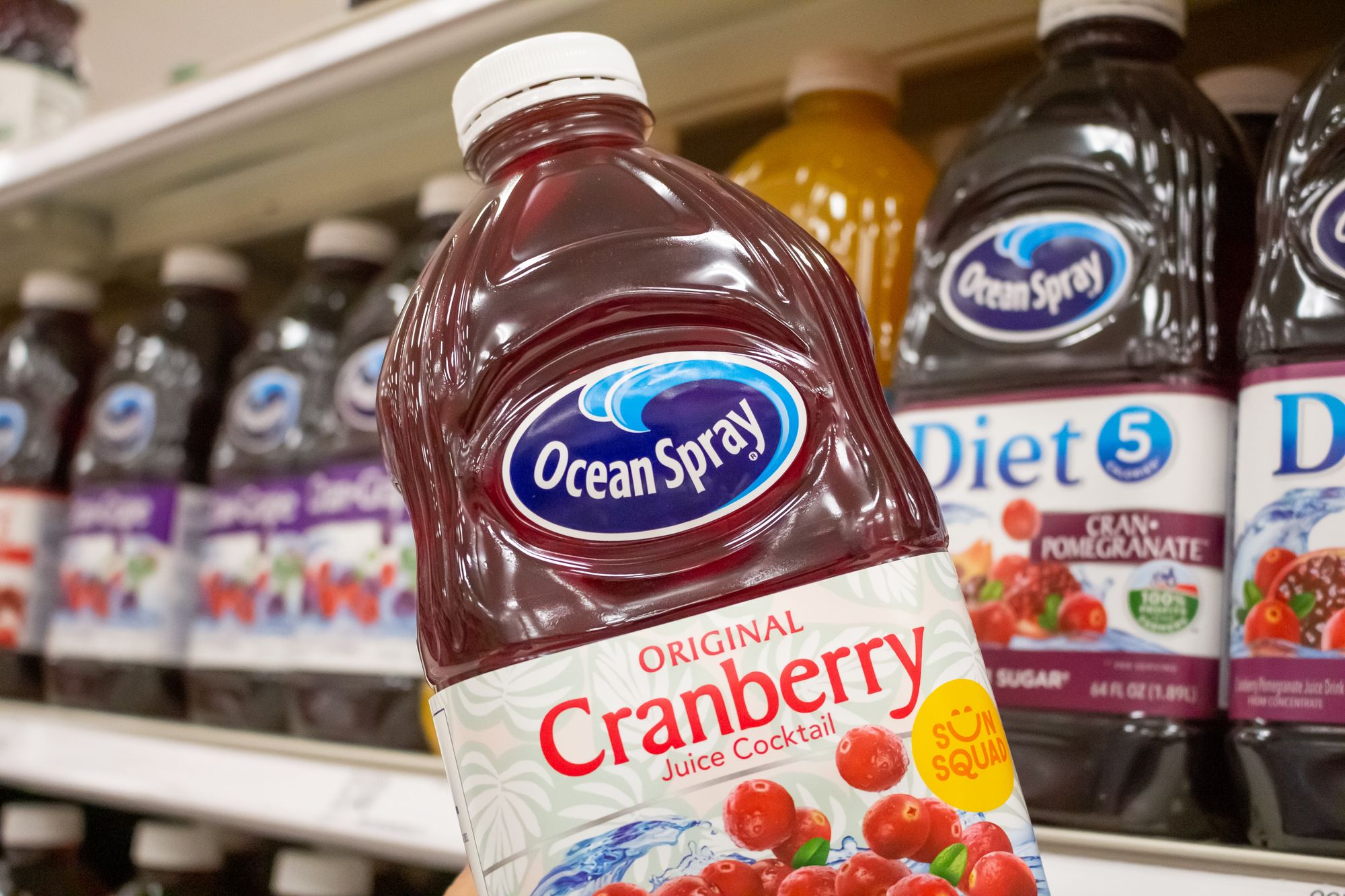
PER 8 OZ: 110 calories, 0g fat, 5mg sodium, 28g carbs (0 g fiber, 25 g sugar), 0 g protein
Sarah Pflugradt, MS, RDN, CSCS, from Fueling Active Kids, warns against consuming Cranberry Juice Cocktails. She advises opting for 100% cranberry juice instead of the cocktail version, as the term "cocktail" typically indicates a high amount of added sugar.
Pflugradt explains, "Although Cranberry Juice Cocktail may sound like a healthy choice with its potential antioxidant benefits, it's best to choose 100% juice if cranberry is your preferred option. The 'cocktail' variety usually contains a significant amount of added sugar."
It's important to note that for children under the age of two, juice is no longer recommended due to its high sugar and calorie content with limited nutritional value. Ocean Spray's Cranberry Juice Cocktail serves as an example of how much added sugar can be packed into cranberry juice. With 25 grams of sugar in just 8 ounces, consuming one serving would surpass the daily recommended limit for added sugar.
3) PUR Cold Pressed Turmeric Lemonade
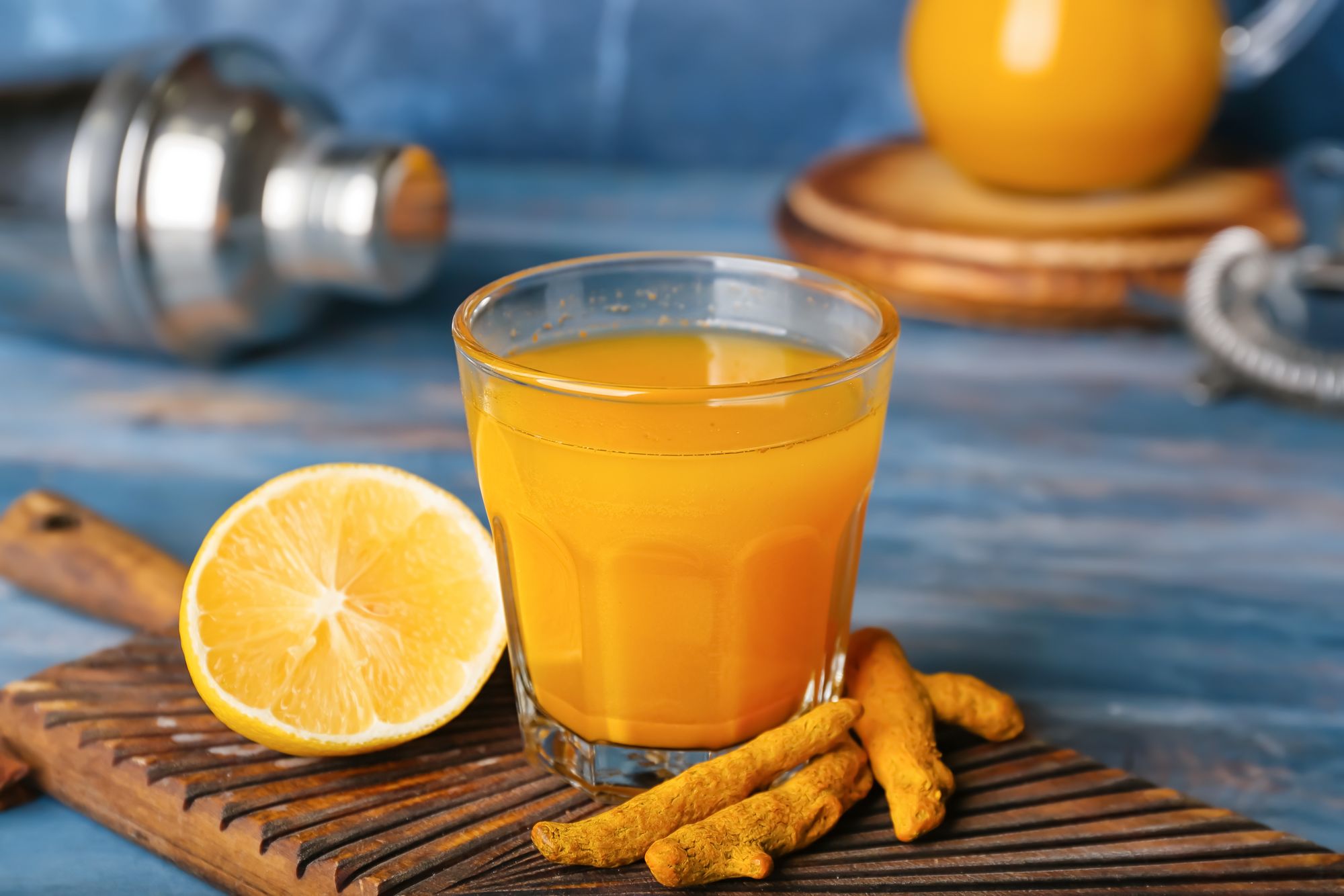
PER 16 OZ: 120 calories, 0g fat, 0mg sodium, 32 g carbs (1 g fiber, 24 g sugar), 1 g protein
Sheri Berger, RDN, CDCES, highlights the misleading nature of PUR Cold Pressed Turmeric Lemonade juice, which may initially appear to be a healthy choice due to the inclusion of anti-inflammatory turmeric. However, upon closer examination, its high added sugar content contradicts the notion of reducing inflammation.
Berger explains, "Despite the presence of anti-inflammatory turmeric, the 16-ounce serving of this juice contains a substantial 22 grams of added sugar, which undermines its potential health benefits. Excessive consumption of added sugar can elevate blood pressure, blood sugar levels, and triglycerides, all of which are markers of inflammation."
To obtain the desired nutritional benefits without the drawbacks of added sugars, PUR offers a line of shot-sized juices that could be a preferable option. These compact servings are packed with antioxidants and additional nutrients, allowing you to enjoy the nutritional benefits in a concentrated form without the excessive sugars.
4) Ocean Spray Pure Unsweetened Concord Grape Juice
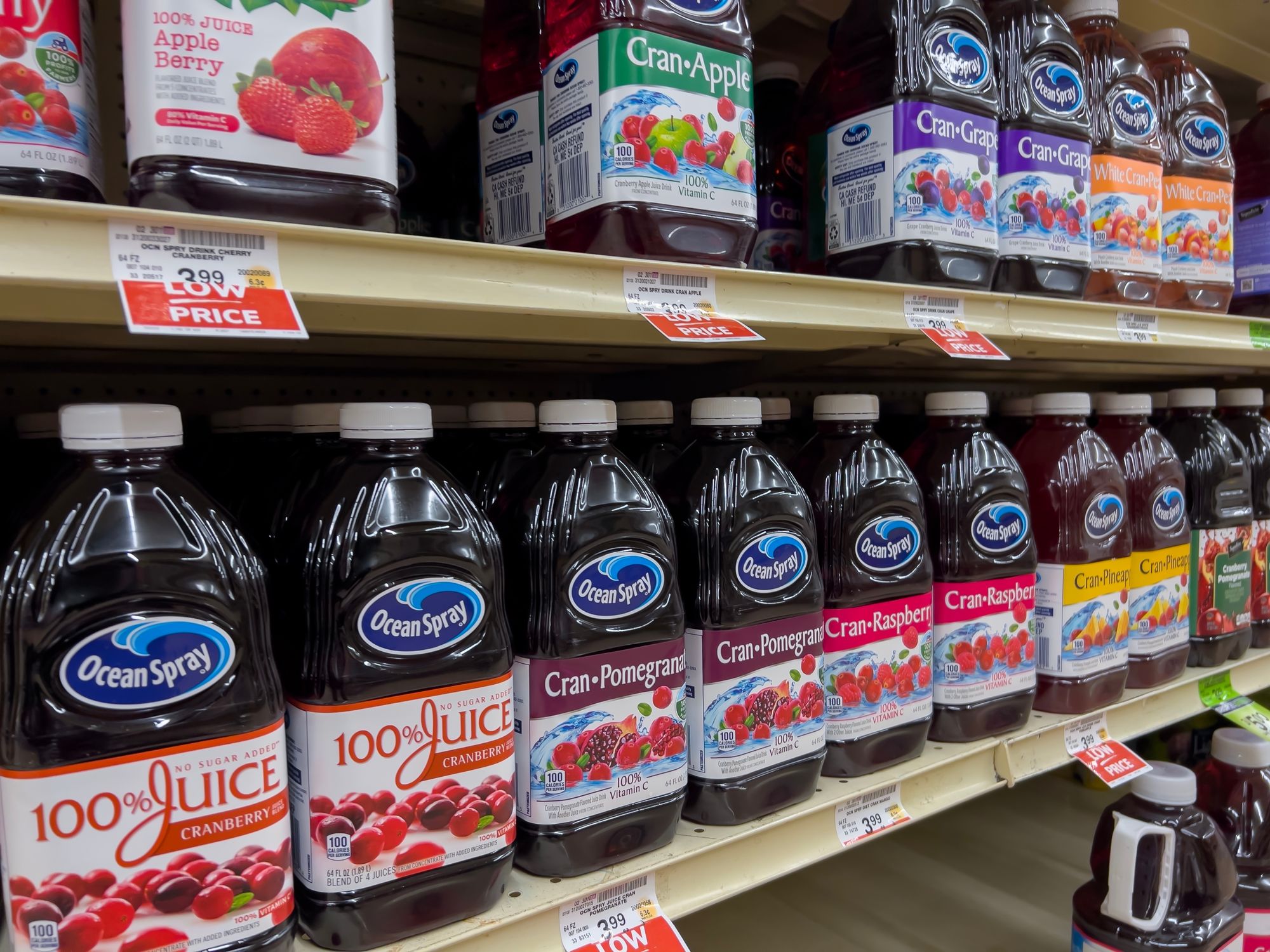
PER 8 FL OZ: 160 calories, 0 g fat, 5 mg sodium, 39 g carbs (0 g fiber, 9 g sugar), 0 g protein
Brittany Delaurentis, RD, highlights the misleading aspects of Ocean Spray's Pure Unsweetened Concord grape juice, which may give the impression that the popular grape juice has been reformulated to enhance its nutritional value.
Delaurentis explains, "Despite the rebranding efforts, a one-cup serving of this juice still contains 37 grams of sugar and 39 grams of carbohydrates. It's important to note that snacking on fresh grapes would always be a better option in terms of nutrition."
While the rebranding might create the perception of a healthier choice, the high sugar and carbohydrate content in the juice raise concerns about its overall nutritional value. Opting for fresh grapes instead would provide a better balance of nutrients and minimize the intake of concentrated sugars.
5) Naked Juice
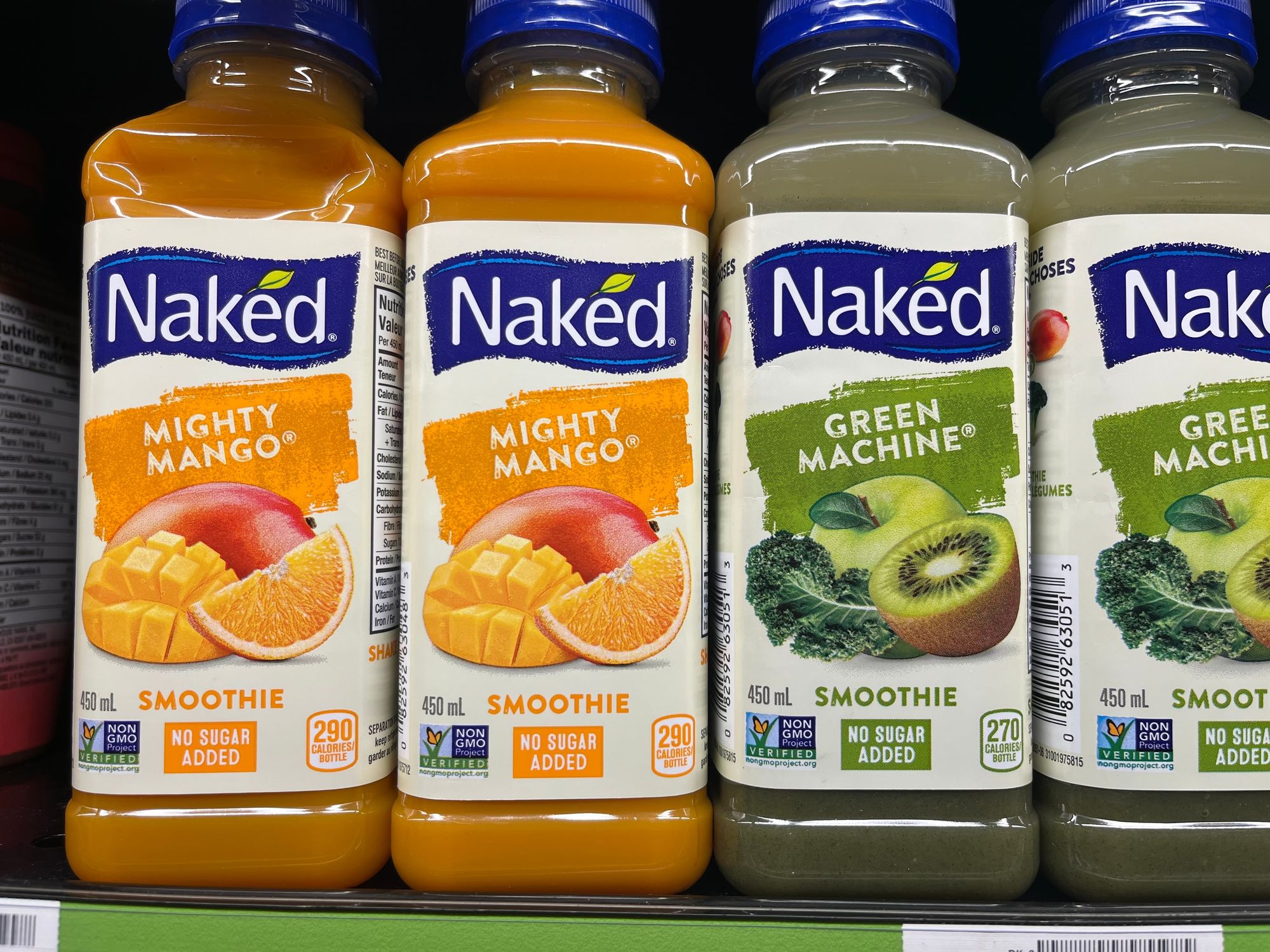
PER 15.2 FL OZ BOTTLE OF BLUE MACHINE: 320 calories, 0 g fat, 20 mg sodium, 76 g carbs (3 g fiber, 55 g sugar), 2 g protein
When it comes to fruit juices that are often perceived as healthy but may not be beneficial for your well-being, Patricia Kolesa, MS, RDN, highlights Naked Juice as a prime example.
"While some Naked Juice varieties do contain fruits and vegetables, certain options like the Blue Machine flavor can contain 50 grams of sugar or even more," explains Kolesa. "This amount exceeds what you would typically find in a can of soda! Consuming excessive added sugars from beverages can lead to blood sugar spikes, 'sugar crashes,' and low energy levels."
To opt for a healthier alternative, Kolesa suggests the following: "I recommend making your own juice or smoothie at home, or focusing on consuming whole fruits whenever possible!" By preparing homemade juices or smoothies, you have better control over the ingredients and can avoid the excessive sugar content often found in store-bought options. Incorporating whole fruits into your diet provides a more balanced approach to enjoying the benefits of fruits while minimizing added sugars.
6) Langers Mango Nectar
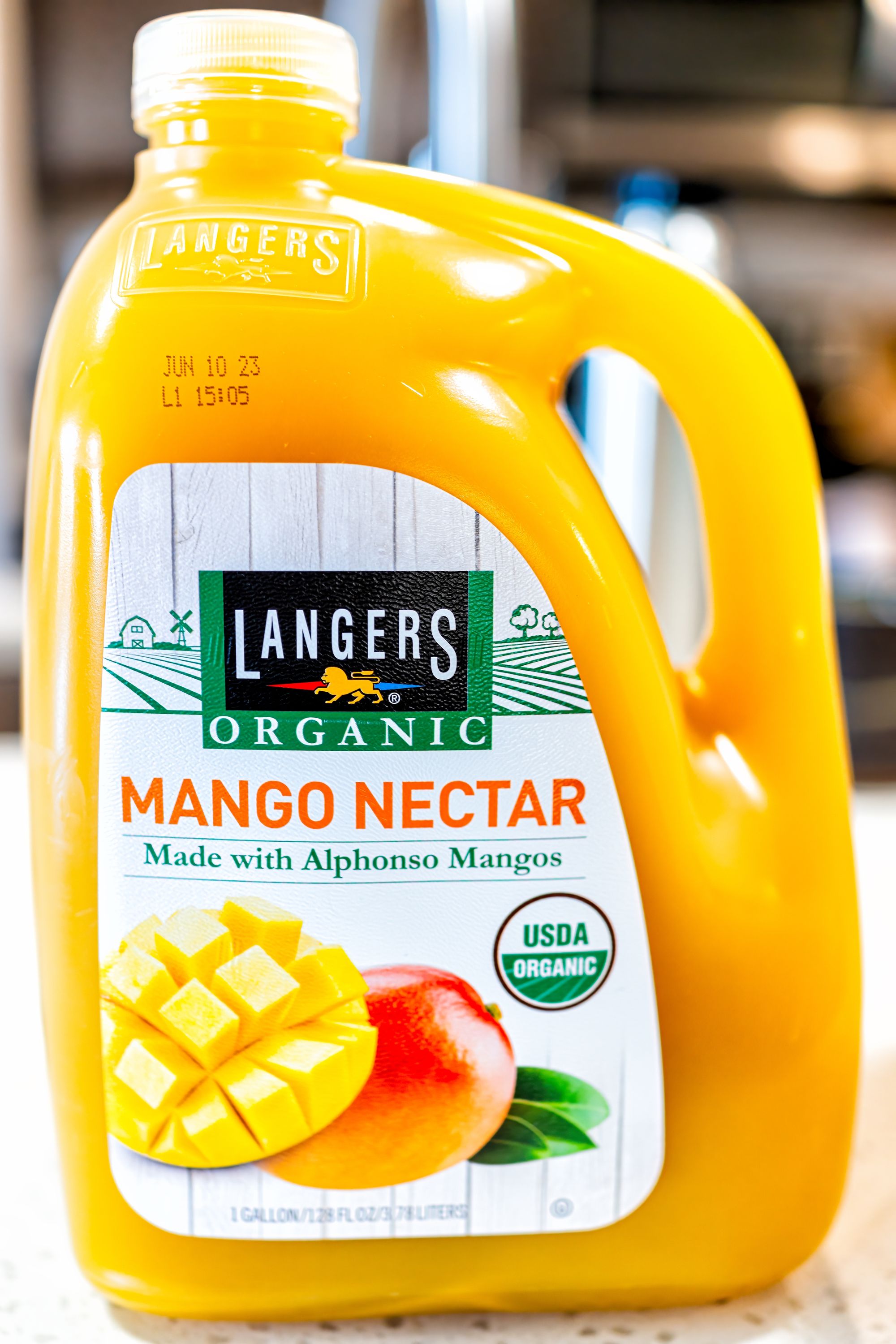
PER 8 FL OZ: 140 calories, 0 g fat, 15 mg sodium, 35 g carbs (0 g fiber, 35 g sugar), 0 g protein
In addition to being cautious of the health halo claims mentioned earlier, it's important to scrutinize any juice that is labeled as "GMO-free" or claims to be free of high fructose corn syrup, as these claims can also create a false perception of healthiness for certain juice products. It's worth noting that juice "cocktails" can often still be loaded with added sugars.
An example that highlights this issue is Langers Mango Nectar juice. Despite its assertion of not containing any high fructose corn syrup, a closer examination reveals that it contains 40 grams of sugar per 10-ounce serving, including 28 grams of added sugars. This amounts to a staggering 15% of the recommended daily sugar limit for a small drink. The primary ingredients of Langers Mango Nectar are filtered water, with minimal amounts of mango puree, citric acid, and natural flavor.
This serves as a reminder to carefully evaluate the nutritional content and ingredient list of juice products, even if they make specific claims about the absence of certain additives. Understanding the true composition of these juices will enable you to make more informed decisions about their suitability for your health.
7) Tropicana Farmstand Tropical Green
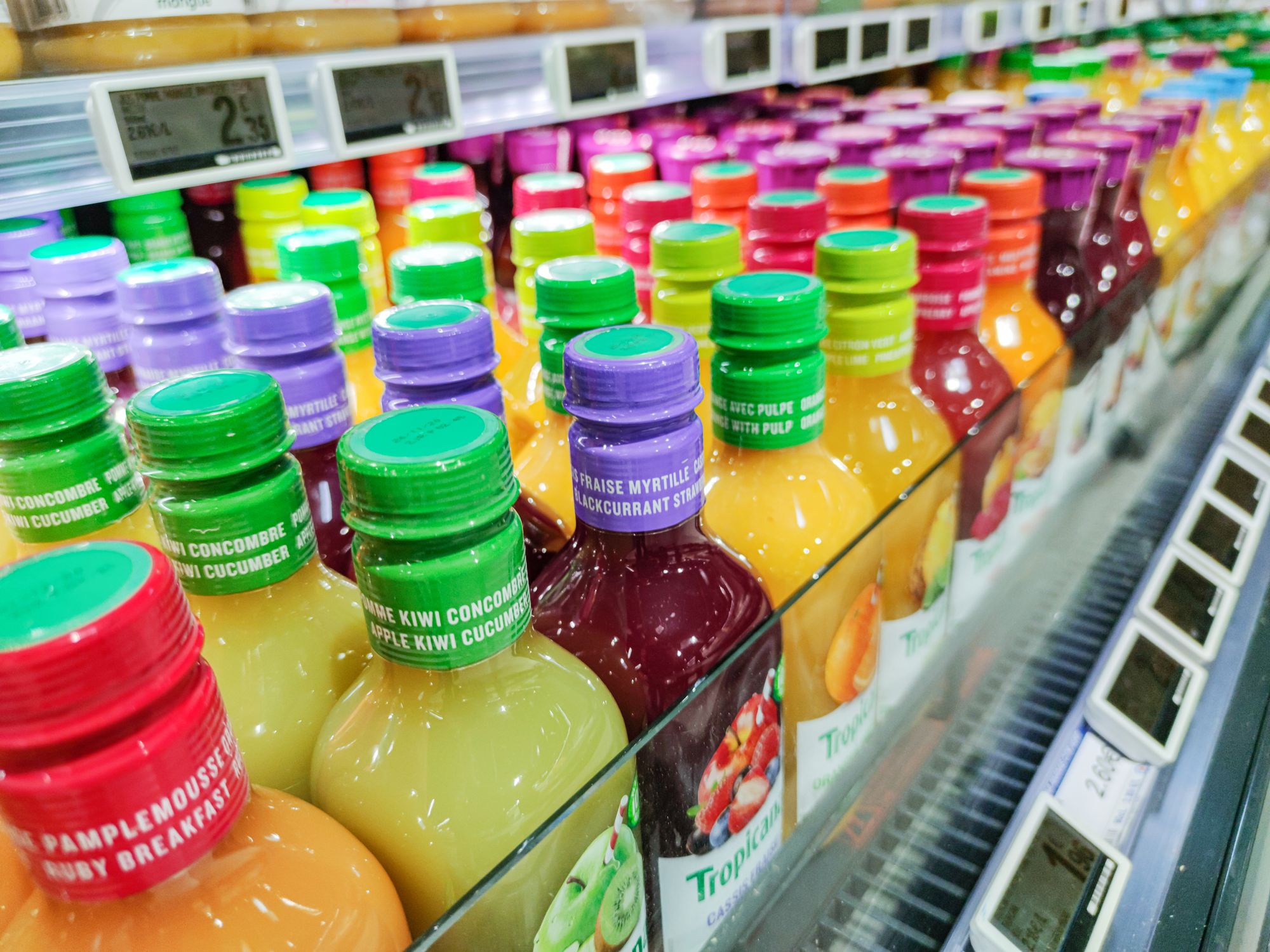
PER 8 FL OZ: 120 calories, 0 g fat, 55 mg sodium, 27 g carbs (0 g fiber, 26 g sugar), 1 g protein
While the color green often symbolizes health, it's important not to be deceived by appearances alone. This is particularly true for Tropicana's Farmstand beverage, which may not live up to the nutritional expectations associated with the color green. Despite claiming to provide two "servings of fruit and vegetables in every glass," this beverage falls short in terms of fiber content and contains a significant amount of sugar.
One crucial aspect that Tropicana's Farmstand beverage lacks is fiber, an essential component typically found in vegetables. While it may contain fruit and vegetable extracts, the absence of fiber diminishes its nutritional value. Fiber plays a vital role in digestion and overall health, and its absence in this beverage is a significant drawback.
It's crucial to carefully consider the claims and nutritional composition of products, even those with a seemingly healthy appearance. Relying on whole fruits and vegetables or freshly made juices can provide a more balanced and nutrient-rich approach to achieving your dietary goals.

